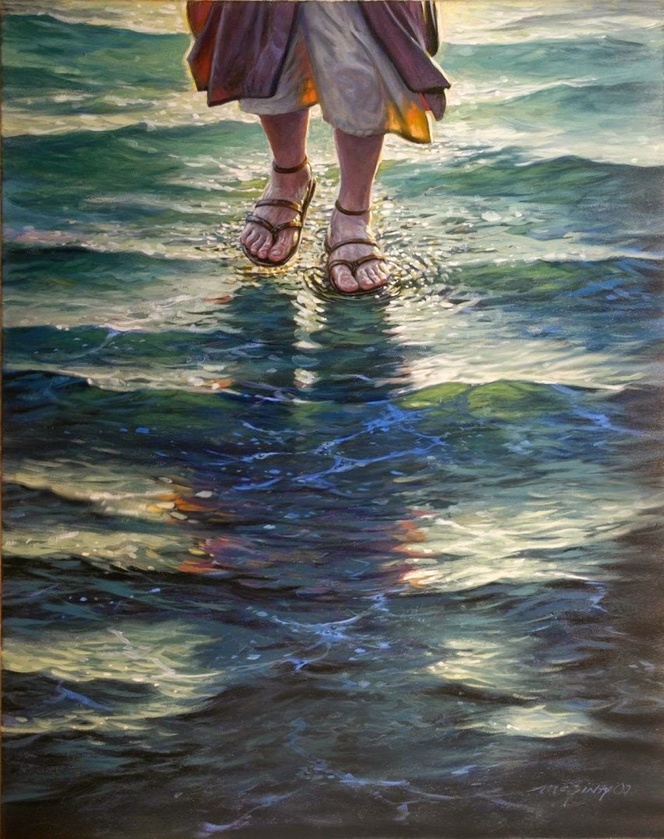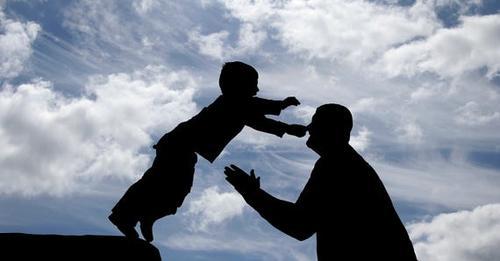So, the Matthew 14:22-33 story was gnawing at me, waking me up at 1AM because of something I had previously overlooked, and I've been following that rabbit hole for the last couple of hours. (I WILL be napping during lunch today, btw ![]() )
)
So, that excerpt contains the story about Peter stepping out of the boat during a storm to follow Jesus as he's walking on the water. SUPER famous scene, right? Also, a SUPER SURREAL scene, no?
There's some MAJOR backstory that we just glaze right over in our modern-day, English-speaking understanding of these stories. I'm currently working on a teaching about what it REALLY meant when Jesus called the guys to become disciples, so understand that's where my mind is currently studying & meditating. Frankly, what I'm discovering is quite revelatory, to me anyway. I'll be sharing the totality of it very soon.
But I HAD to bring you at least this part right now. No idea why, but it got me out of bed and into my office at 1AM, so you're kinda stuck with me in this rabbit hole, if you want to be ![]()
So, context is everything. It just IS. These letters and historical accounts ("testaments" or "testimonies") we find gathered together for us in the "New Testament" are written to a specific people, by specific individuals, within a specific time and in a specific place. So, understanding those factors are KEY to "getting what they really mean". And if, like me, you believe that these writing are *inspired* by God (not *dictated* like a transcript, but *inspired* like when you go to a wine and paint event and everyone present walks away with a beautiful, individual work of art *inspired* by the same subject piece - this is a huge distinction I'll dive into later. It's the same reason no two eyewitness testimonies to ANYTHING are 100% identical.) the original authors are communicating deep truth, flavored by their lived experiences.
Throughout Biblical history (the written history of a specific group of people - the Jewish people, and of course Jesus was a Jew) the teachers of their people were (and still are) called Rabbis. The children of their culture were taught from around the age of 6 up through the age of basically their mid-teens to memorize the scriptures. First level is to memorize the Torah (what we call the Books of Moses, or the Books of the law - the first 5 books of the Christian Bible) and then as they progress, they move through the historical books all the way through what we call the Major and Minor Prophets - eventually covering the entirety of what we call the Old Testament. MEMORIZED all of it, not just "know" it. MEMORIZED WORD-FOR-WORD.
Wait, what? No way kids that young can commit all of that to memory. Really? Go ask your kid to recite all the words to ANY song by their favorite musical group today, or the lines from their favorite movie. I don't know about you, but I can rattle ANY of those off right now (I'm in my 50's) from the late 70's and early 80's. So, yes - it's not a matter of ability, but of cultural focus.
Now, OUT OF those bright and faithful students of the local Rabbi, only a FEW were counted "good enough" (at memorization, recitation, etc.) to continue on into a further educational trajectory that would end in they themselves "being called to follow" their Rabbi, living daily life with their Rabbi, basically being his "shadow" at all times and then eventually also becoming a fully vested Rabbi in their own right. The rest of the "kids who didn't make the cut" were traditionally told after their bar mitsvah to go home, learn and master their family trade with honor, get married, make babies and pray for THEM to become Rabbis.
The nuance of Jesus going missing when He was about 14ish, and the story of Mary & Joseph panicking that they couldn't find him - only to learn He was actually back at the Temple TEACHING the Rabbis somehow now has quite a bit more texture, at least in MY English-speaking mind.
When Jesus is walking along the shore, calling these "fishermen" (NOT worthy scholars, but sent home to master their family trade) to "follow him", is HUGE. This RABBI found them WORTHY. Like, "clutch the pearls - my baby just got a 100% free ride to Harvard" type of worthy, within their social construct of the day. There was a saying of the day that went something like "may you be covered in the dust of your Rabbi's sandals", intimating you were welcomed into an elite priesthood very few could enter, because of WHO you "shadowed".
THIS is what Jesus was calling these 12 rag-tag "castaways" UP INTO. We're not so familiar with a Caste-type society, especially one developed within a clear theocracy, as the New Testament accounts were written, lived and experienced within. So, basically, this "called to follow the Rabbi" distinction is MUCH deeper-reaching than we can begin to know in our own English-speaking, westernized culture present day.
So, now cross-referencing ALL OF THIS cultural and historical and sociological foundation BACK into the scary rocking boat, bobbing up and down and sideways onto the stormy sea we find described in the Matthew 14:22-33 account... something AMAZING jumps out. It was amazing enough to roll me out of my warm bed, drag me here into my office to turn on my computer and sit down with my "Miss Frizzle / Magic School Bus" crazy hair, in my jammies w/ gray bunny slippers on, while my utterly codependent bulldog Pork Chop snores like a dragon on his bed here in the corner of my office.
We're living in tumultuous times. I don't think any of us reading these words can argue with that. What I'd like to offer for consideration from Matthew's story of that crazy night on the boat is this:
This Rabbi who walked up to these young men (who were around 17-18 yrs old at the time, according to many historical and sociological accounts - these were HIGH SCHOOL KIDS!) and RENAMED THEM as "WORTHY" after their own religious institution has declared they were not. In this scene, the boys are FREAKING OUT... but Jesus is now standing there ON THE WATER, bidding them to chill out in the midst of a tumultuous storm. The implications of that alone are HUGE. But He's just standing there - as almost a "think again about who is "in charge" here" visual exclamation point - just WALKING on top of these stormy waters as if they were no biggie. (Even today, to walk on top of something is to show a mastery of it in middle eastern culture, and to so much as to point your shoe at someone is a hard-core insult.)
ALL of that is IMPORTANT to "get" the meaning of this story, of course. But, this wasn't the part of that story that woke me up and dragged me in here to click these words away to share with you. It was the Peter part.
"25 Now in the fourth watch of the night Jesus went to them, walking on the sea. 26 And when the disciples saw Him walking on the sea, they were troubled, saying, “It is a ghost!” And they cried out for fear.
27 But immediately Jesus spoke to them, saying, “Be of good cheer! It is I; do not be afraid.”
28 And Peter answered Him and said, “Lord, if it is You, command me to come to You on the water.”
29 So He said, “Come.” And when Peter had come down out of the boat, he walked on the water to go to Jesus. 30 But when he saw that the wind was boisterous, he was afraid; and beginning to sink he cried out, saying, “Lord, save me!”
31 And immediately Jesus stretched out His hand and caught him, and said to him, “O you of little faith, why did you doubt?” 32 And when they got into the boat, the wind ceased.
33 Then those who were in the boat came and worshiped Him, saying, “Truly You are the Son of God.”
So many of us read this - and I did, frankly, until this morning - as this exchange being some sort of proof of Jesus demonstrating this Divinity. But there's more here...
Peter has faith enough IN JESUS to step out onto the water... but it ISN'T JESUS WHO'S SINKING.
This DIVINE RABBI has already called him out, declared him worthy and called him to "be covered in the dust of his teachings" (as the common saying of the day would infer on the disciple of a Rabbi). Now, He's saying “Be of good cheer! It is I; do not be afraid.” Peter himself says (doubting?) “Lord, if it is You, command me to come to You on the water.” Jesus says "Come."
To his credit, Peter stepped out in faith onto the water. Usually the "take-away" from this story ends up being something like "Keep your eyes on Jesus"...
But Jesus KNEW Peter was WORTHY, CALLED and most importantly, had been FOLLOWING HIM and was a first-hand witness to so many examples of the absolute IMPOSSIBLE unfolding before his (Peter's) eyes. HOWEVER, we see here that Peter's lived experience overcame his faith in the impossible.
Jesus sincerely believed in Peter's potential from day one. It was PETER'S lack of faith in who GOD SAID HE WAS that caused him to look at the crazy winds, get scared and begin to sink.
![]() JESUS BELIEVED IN PETER MORE THAN PETER BELIEVED IN HIMSELF.
JESUS BELIEVED IN PETER MORE THAN PETER BELIEVED IN HIMSELF.
Read that again.
God believes in your innate power (His Spirit within you) more than you do.
YOU CAN DO ANYTHING YOU PUT YOUR MIND (& SPIRIT) TO.
(This begs the question, of course: WHAT are you going to use those powers FOR? What water will you walk on... what storm will you pave a way calmly, peacefully, joyfully THROUGH... to the fearful amazement of the peers in YOUR boat? YOU'RE INFINITELY POWERFUL ![]() )
)



















